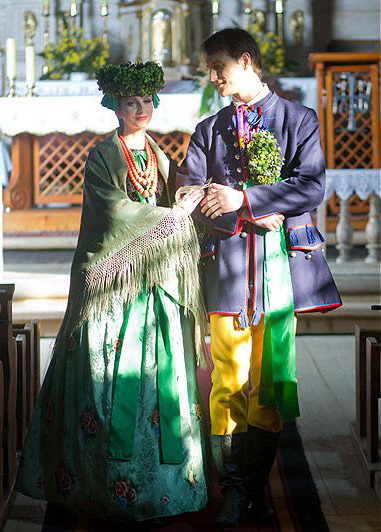Curate, connect, and discover
How Neat - Blog Posts
Hi! What would a traditional bride from Śląsk wear on her wedding day?
Hello! Answering your question might be a bit complicated, because Śląsk is quite a large area divided into two main subregions [Górny Śląsk - Upper Silesia and Dolny Śląsk - Lower Silesia], each having several types of costumes. However, there are some common elements that I might show you below.
Most of Silesian brides would wear: a jacket/blouse called jakla [often in black colour seen as the most elegant/dignifying - but it was changing with time and fashion trends], a skirt painted or embroidered with floral motifs [common in most of Silesian festive clothing] and a so-called “turkish shawl” [chusta turecka with decorative patterns and fringe] worn over the shoulders. One of characteristic elements is also a wreath/crown made usually from green myrtle - and the flower crowns were reserved for the bridesmaids during the wedding that [in general, flower wreaths would be worn only by unmarried women].
Here’s example from Bytom - clothing called strój rozbarski after Rozbark that is nowadays district of the Bytom city [source]:

Another shot of the Bytom wedding costume [source]:

Here you have a presentation of wedding clothing from Mysłowice city [source]:

Couple from modern-day Katowice, beginning of 20th century [source]:

Two examples from Siemianowice Śląskie, 1930s and beginning of 20th century [source]:


Two photographs from the beginning of 20th century showing couples from Racibórz on their wedding day [sources: 1,2]:

Another example from Racibórz, second picture shows the act of changing the wreath to a married woman’s head covering [source]:


And the same custom of changing the wreath to a headwear on the example of Bytom costume [source]:

In general, the myrtle wreaths were so important, that most of the brides would later keep them in a flat showcase on the wall as a memorial of the wedding [image below is a printscreen from the Silesian Museum’s virtual tour]:

The black jakla jacket might look a bit boring at the first sight [as I’ve heard before] - but it’s only an effect on badly balanced photographs… just look at these details [source]:

This is just a quick reply that focuses on the Upper Silesia region, but I hope it gives you a good picture.
[note to self: I should post more examples from Silesia]